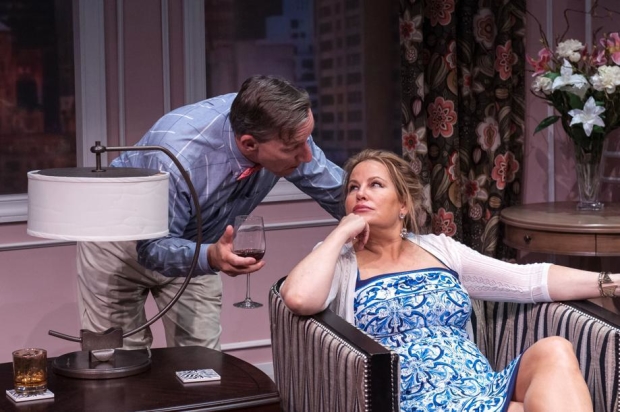Saving Kitty

(© A.R. Sinclair Photography)
Though it had its world premiere back in 2012 at the Wellfleet Harbor Actors Theater, Marisa Smith’s Saving Kitty, now running at Central Square Theater, has enjoyed a handful of readings and productions over the last several years. Star Jennifer Coolidge comes closest to salvaging the evening, but her efforts are no match for Smith’s hodgepodge of a play.
Kate and Huntley Hartley are well-to-do, if unhappily married, atheist Manhattanites who are preparing for the arrival of their daughter Kitty and her new boyfriend, Paul. When Kate learns that Paul is an Evangelical Christian educator and that Kitty has decided to step away from her successful career as a television news producer in order to reevaluate her life’s trajectory, Kate becomes determined to destroy their relationship.
The production feels like a two-hour-and-20-minute sitcom version of Guess Who’s Coming to Dinner, minus any discernible theme. Fare as light as this often makes impossible demands of its cast to rise above the subpar material and deliver convincing performances, but a lackluster play can still be an otherwise worthwhile experience in the hands of a top-notch cast. Unfortunately, most of the performances are as unremarkable as the play itself.
As the supposedly intelligent but perpetually engaged Kitty, Lydia Barnett-Mulligan suffers from being both miscast and having little in the way of comic timing. As her ultrareligious new boyfriend, Paul, Lewis D. Wheeler is endearing if undistinguished, though the credibility of his performance is in question thanks to his haphazard accent. Alexander Cook gives an accomplished performance as Huntley, though there is a lack of chemistry between him and onstage daughter Barnett-Mulligan.
There is, however, a lot to be said for star power. Jennifer Coolidge — whose shoulders must be mighty sore from carrying this show on her back — is, for the most part, positively and divinely hilarious. Her trademark humor is delectably on display here, and she makes the most out of absolutely every comic morsel. The success of Coolidge’s performance has less to do with her material and everything to do with her innate understanding of how to make people laugh. Although segments of her performance are tentative and seem too rehearsed, she proves to be a fine stage actress. In one particularly dramatic scene late in the second act, it becomes apparent that Coolidge has some serious dramatic chops too.
Smith has written a play that, despite the strength of some zingers, falls all too frequently into "been there, done that" territory. More could be forgiven if the play were 90 minutes with no intermission, but there’s not enough meat here to justify the current two-act running time. Worse, the play is absolutely devoid of any tangible theme. While Smith has a knack for one-liners, she relies too comfortably on trite conventions and seemingly borrows from a myriad of other works without making much effort to mask the provenance. In one scene, appropriating a line from The Devil Wears Prada, Kate, who is kept waiting for her coffee, gripes, "Did you go to Brazil to grind the beans?" Near the bottom of the second act, in an attempt to ground the play with some kind of theatrical relevance, Kate ludicrously laments, "Even Nora had her own life." A Doll’s House this ain’t.
The direction of Lee Mikeska Gardner only reaffirms the play’s defects, as the story clunks and dawdles along without any real objective. Though the text is problematic to begin with, Gardner makes a series of choices that hinder the success of the play, including, on multiple occasions, a stagehand dressed as a waiter taking an exorbitantly long time to clear a few props, all the while yucking it up for a few laughs. It’s this kind of irrelevance that truly halts the believability of the play. Steven Royal’s attractive apartment set helps some, and the costumes of Barbara Douglass lighten the mood a bit, particularly Kate’s bedtime ensemble.
While Saving Kitty has its faults, in the hands of a deft comedian like Coolidge the material yields some laughs. One line of particular truth is spoken late in the play, as Kitty says to Paul, "You look miserable." That line elicited a few groans of empathy from the audience. Don’t worry, Paul, you’re not alone.











